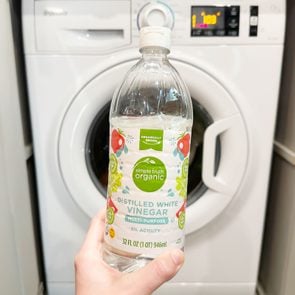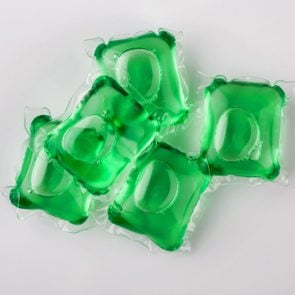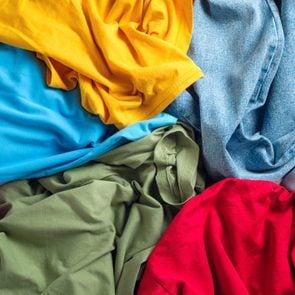How to Make Homemade Laundry Detergent for the Best Results
Updated: Apr. 15, 2024
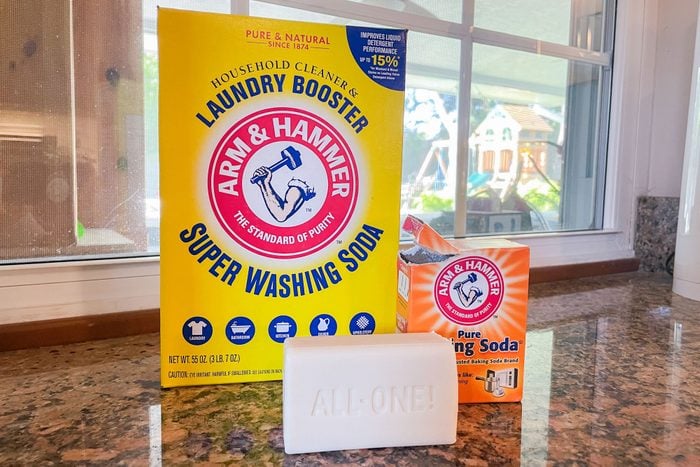
This homemade laundry detergent recipe will help you get clean, fresh-smelling clothes—without unwanted chemicals and fragrances
Laundry is a fact of life, but it’s a chore that most of us find tedious. Plus, it can get expensive. In my household of four (which includes two very messy toddlers), I typically run a minimum of four loads a week and quickly work through my stash of store-bought detergent. Though I have been a cleaning editor for nearly 15 years, I have not tried my hand at homemade laundry detergent … until now.
Bloggers and other fans rave about making your own detergent for a few reasons. First, there’s the potential cost savings; it’s supposed to be cheaper than store-bought detergent. And second, you know exactly what’s in your detergent, which is helpful for people with allergies and skin sensitivities. That’s also important for those who are turned off by the smells in commercially produced detergents and would prefer to have more of a custom scent (or no scent at all). When you make your own detergent, you’re in control.
With that in mind, I decided to give this experiment a try. But before I jumped in, I reached out to a natural-cleaning expert, a professional dry cleaner and a representative from the American Cleaning Institute (ACI) to get their advice. Ahead, learn how to make homemade laundry detergent that will last you for up to 50 loads—along with the essential pro tips that will ensure sure your laundry is as clean as possible.
Get Reader’s Digest’s Read Up newsletter for more cleaning, humor, travel, tech and fun facts all week long.
About the experts
|
What to know before using homemade laundry detergent
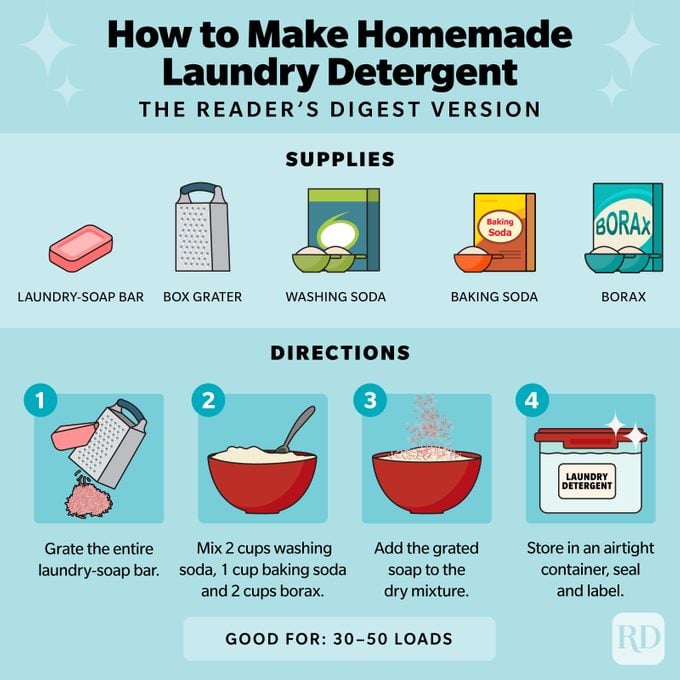
We need to start with a few important caveats. The first is from Darius Stanton at the ACI: “When you make your own detergent, you’re on your own,” meaning there’s no way to quantify exactly how effective it is. Plus, adds cleaning expert Becky Rapinchuk, the founder of Clean Mama, “the best detergents have enzymes in them. DIY laundry detergent does not, so this odor and stain remover is missing, and your clothes might not get as clean.” If you do have stains, pre-treat them before running your load.
The experts also agree that when it comes to water temperature, warm to hot water is better with a DIY detergent because the heat will help the soap dissolve appropriately. Cold water is the most sustainable choice, but using it in this instance could lead to residue being left on your textiles.
How to make homemade laundry detergent
With all the basic ingredients for success, this DIY laundry detergent should cover your clothes’ basic needs for 40 medium-size loads. Just remember that stains will need to be treated separately.
Supplies you’ll need
- Laundry-soap bar
- Box grater
- 2 cups washing soda
- 1 cup baking soda
- 2 cups borax
Step 1: Grate the laundry-soap bar
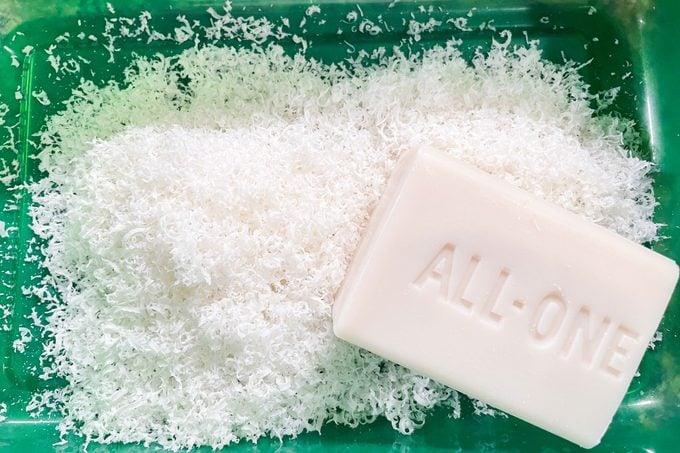
Using a box grater, grate the entire bar of laundry soap. This will make it small enough to disperse among the other powdered ingredients and dissolve quicker when mixed with water in your washing machine.
Step 2: Mix the dry ingredients
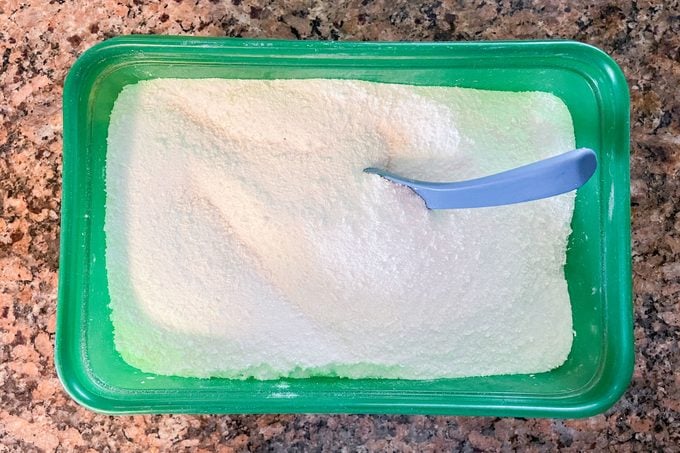
Mix 2 cups of washing soda, 1 cup of baking soda and 2 cups of borax in a large, airtight container.
Pozniak explains the benefits of each of these ingredients: “Washing soda is an alkaline substance that has mild water-softening properties that help neutralize hard-water minerals in the wash water, which allows detergents to perform better. Baking soda is washing soda’s weaker cousin that helps breaks down acids and oils. Borax is used to soften water, so it’s a great addition if you live in an area with hard water.” Rapinchuk adds that the washing soda and baking soda are also odor removers.
Step 3: Add the grated soap to the dry mixture
Transfer your grated soap flakes into the dry mixture, and stir to combine.
Step 4: Store properly
Cover this mixture with a tight-fitting lid, and label the container, including a reminder of how much to use per load (1 to 3 tablespoons, depending on the size of your load).
| ♦ Pro tip |
| I opted for the unscented Dr. Bronner’s Castile bar soap because I planned to add eucalyptus essential oil to the mixture. However, laundry expert Zachary Pozniak pointed out that “washing soda doesn’t discriminate between body oil and essential oil.” That means a DIY recipe will remove the essential oils and their accompanying scents, ultimately leaving no scent on your clothes when they come out of the wash. Going forward, I’d opt for a scented soap bar instead of essential oil to infuse some of my desired fragrance. |
How this homemade laundry detergent performed in the wash
I tested three different versions of powdered detergent to see if I could identify varying results. (As a note, I have a traditional top-loading machine with a central agitator.)
Test 1: Basic recipe
First, I went with the most basic formulation, which has fewer ingredients than the full recipe listed above: 1 cup grated Castile soap, 1 cup baking soda, 1 cup super washing soda. As a powder, it smelled fresh but not fragranced. (Like clean laundry—go figure.) After the load dried, I didn’t notice any scent on the items, but they appeared clean.
Test 2: Basic recipe plus borax
Next, I tried a version with borax added in. Again, there was no scent, and everything seemed to come out clean with no residue remaining.
Test 3: Full recipe
Then I used the full recipe for homemade laundry detergent noted above. Once again, it seemed effective and left no residue or fragrance behind on my garments. Since I couldn’t tell just how effective the detergent was in the wash, I gave this same formula a try when hand-washing delicates. If the dirty water that remained was any indication of its efficacy, I’d say it worked quite well!
How much homemade laundry detergent should you use per load?
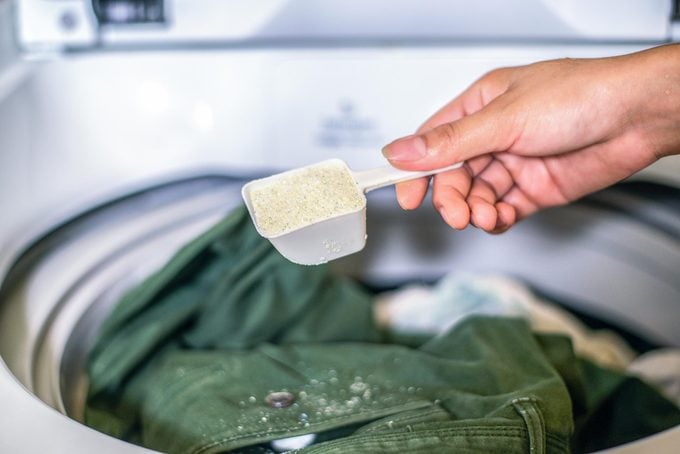
Use 2 to 3 tablespoons of homemade powdered detergent per large load. As you become familiar with how it works in your machine and with your water, you may need to adjust that ratio a bit, but this is a good starting point. At this rate, the above recipe should last you for 30 to 50 loads.
How do you add homemade laundry detergent to the wash?
Add this powdered detergent directly to the washer drum on top of your clothes. As the basin fills with warm to hot water, the soap flakes and powdered ingredients should begin to dissolve. If you put the powder into the detergent dispenser, there’s a risk it won’t dissolve. “The fewer compartments it has to pass through, the better,” says Pozniak.
How should you store homemade laundry detergent?
Store your homemade laundry detergent in an airtight container in a cool, dry place (and out of reach of little hands). If any moisture gets into the container, the mixture will clump and become unusable. Be sure to label your container with what’s inside and a reminder for how much to use per load.
Does homemade laundry detergent expire?
Homemade powdered laundry detergent does not expire and will last indefinitely. A DIY liquid formulation might only last one to two months. Plus, Pozniak points out that “traditional liquid detergents are tested for shelf stability to ensure all their ingredients get along and last for a very long time. DIY recipes do not account for that.”
Is homemade laundry detergent really cheaper than store-bought detergent?
The short answer: It depends. For the longer one, let’s do a little math. I spent $9.62 for the ingredients to make this homemade laundry detergent, which was enough a little over 50 loads. But to compare it to the store-bought options, some of which offered just 42 loads, I needed to break it down further. The DIY detergent recipe worked out to $0.17 per load, or $7.14 for 42 loads. Compare that to these commercially produced options:
- Powder detergent, from $0.16 to $0.26 per load (or $6.72 to $10.92 for 42 loads)
- Liquid detergent, from $0.12 to $0.22 per load (or $5.04 to $9.24 for 42 loads)
- Laundry pods, at $0.31 per load (or $13 for 42 loads)
So, in the end, this DIY detergent was a lot cheaper than my beloved laundry pods—nearly half the price! That said, it was a little more competitively priced with powder and liquid detergent, depending on the brand you buy, but there’s a good chance that it can save you money, not to mention give you literal control over what ingredients you use in your laundry.
FAQs
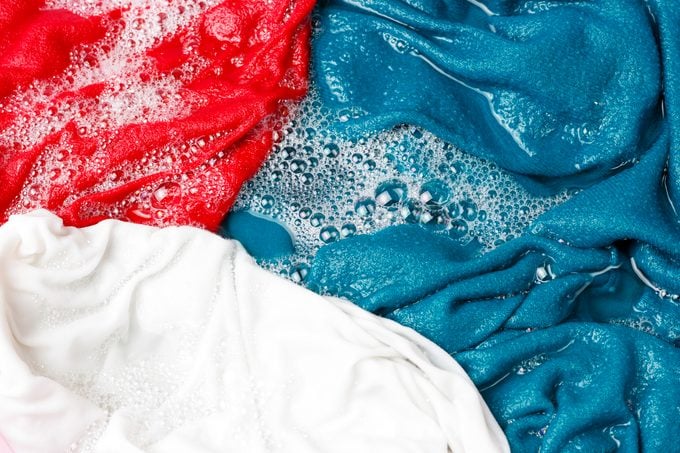
Does homemade laundry detergent really clean clothes?
Homemade detergent “isn’t always effective in every situation,” explains Rapinchuk. But for basic cleansing, a homemade detergent should work. However, Pozniak notes that a homemade detergent is not as good at removing soil (“the cleaning-industry term used to describe stains and foreign stuff on clothes”) as commercially produced versions.
Can you make laundry detergent without borax?
A homemade detergent can be made with or without borax. Borax is a laundry booster that can help ramp up the cleaning power of your homemade detergent and soften water, but is not necessary for it to be effective at removing soil.
Does homemade laundry detergent work in HE washers?
“Since these homemade formulas will vary widely, it’s impossible to say,” says Stanton. “The only way to be certain is to use a formulated product and to follow both the product and appliance directions.” But if you do try it out, Mary Marlowe Leverette, a laundry expert with more than 40 years of experience, recommends using only 1 to 2 teaspoons of a homemade detergent in an HE washer, since these washers use much less water to wash and rinse clothes than standard top-load washers. “Using less detergent will prevent residue from remaining on the fabrics,” she explains.
Why trust us
At Reader’s Digest, we’re committed to producing high-quality content by writers with expertise and experience in their field, in consultation with relevant, qualified experts. For this piece on how to make laundry detergent, Stephanie Sisco tapped her experience as a longtime home and cleaning editor, and then Mary Marlowe Leverette, a fabric-care, stain-removal and laundry expert with more than 40 years of industry experience, gave it a rigorous review to ensure that all information is accurate and offers the best possible advice to readers. We also relied on reputable primary sources, including cleaning and health experts and reputable organizations. We verified all facts and data and backed them with credible sourcing, and we will revisit them over time to ensure they remain accurate and up to date. Read more about our team, our contributors and our editorial policies.
Sources:
- Zachary Pozniak, professional dry cleaner and laundry-care expert at Jeeves New York; email interview, March 25, 2024
- Becky Rapinchuk, natural-cleaning expert and owner of Clean Mama; email interview, March 27, 2024
- Darius Stanton, director of regulatory science at the American Cleaning Institute; e-mail interview, March 28, 2024
- Cold Water Saves


